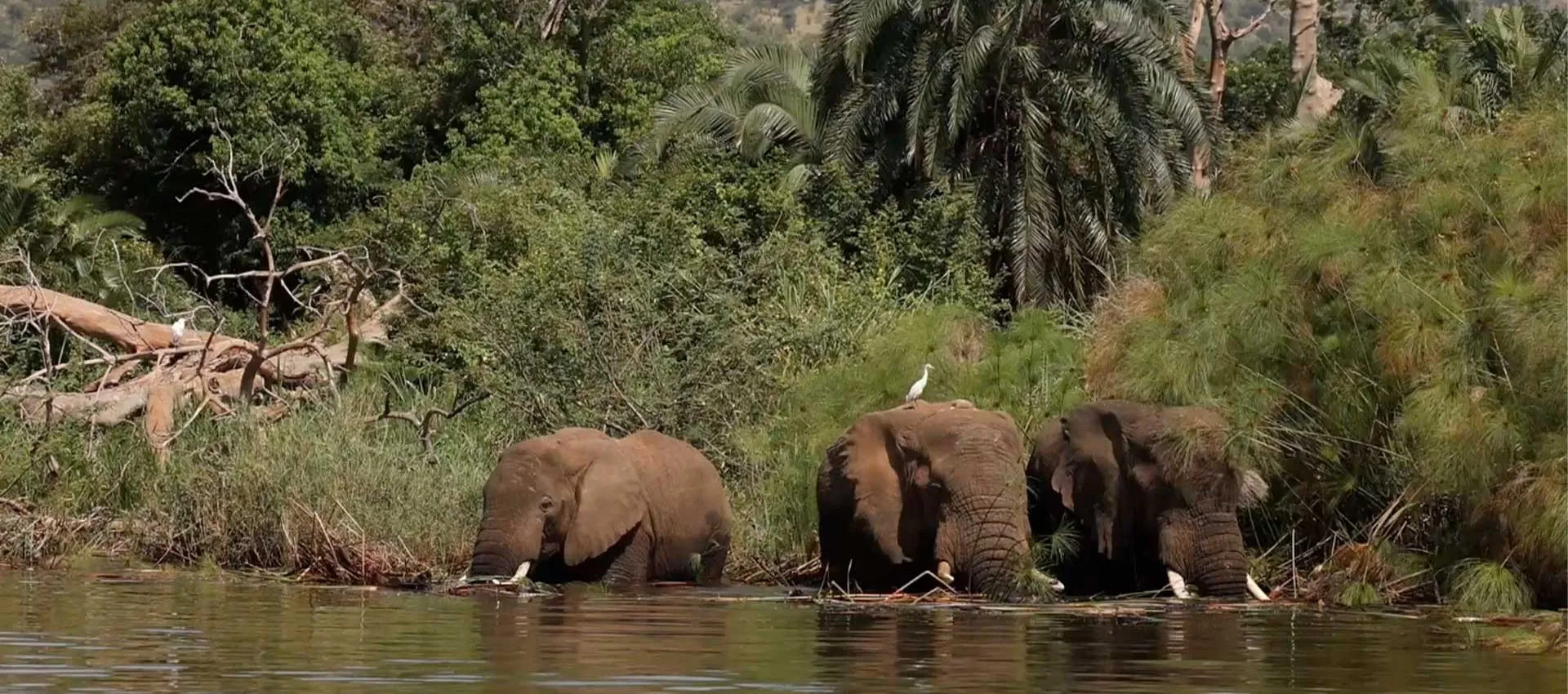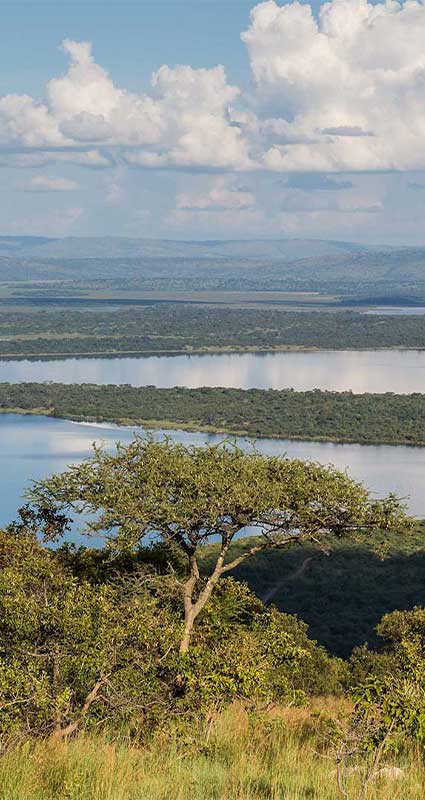SAFARI CAMPS for responsible travellers
The preferred booking platform for lodges & bush camps that offer tangible, measurable benefits for conservation & communities
The 1,122km2 (112,200 hectares) Akagera National Park is situated on the eastern edge of Rwanda, where the sinuous bends of the Akagera River mark the boundary with Tanzania. Here you will find Central Africa's largest protected wetland, consisting of a complex system of lakes linked by papyrus-lined swamps.
The park's south has more water and dense vegetation, and the north has more open areas. Akagera is Rwanda's only protected area for savannah-adapted wildlife and hosts the Big 5.
READ MORE about Akagera National Park
Expert tips:
• focus on boat cruises + bird watching in the park's south, and game drives in the north
• must-do activity: 'Behind the Scenes' (details below)
Information about Akagera
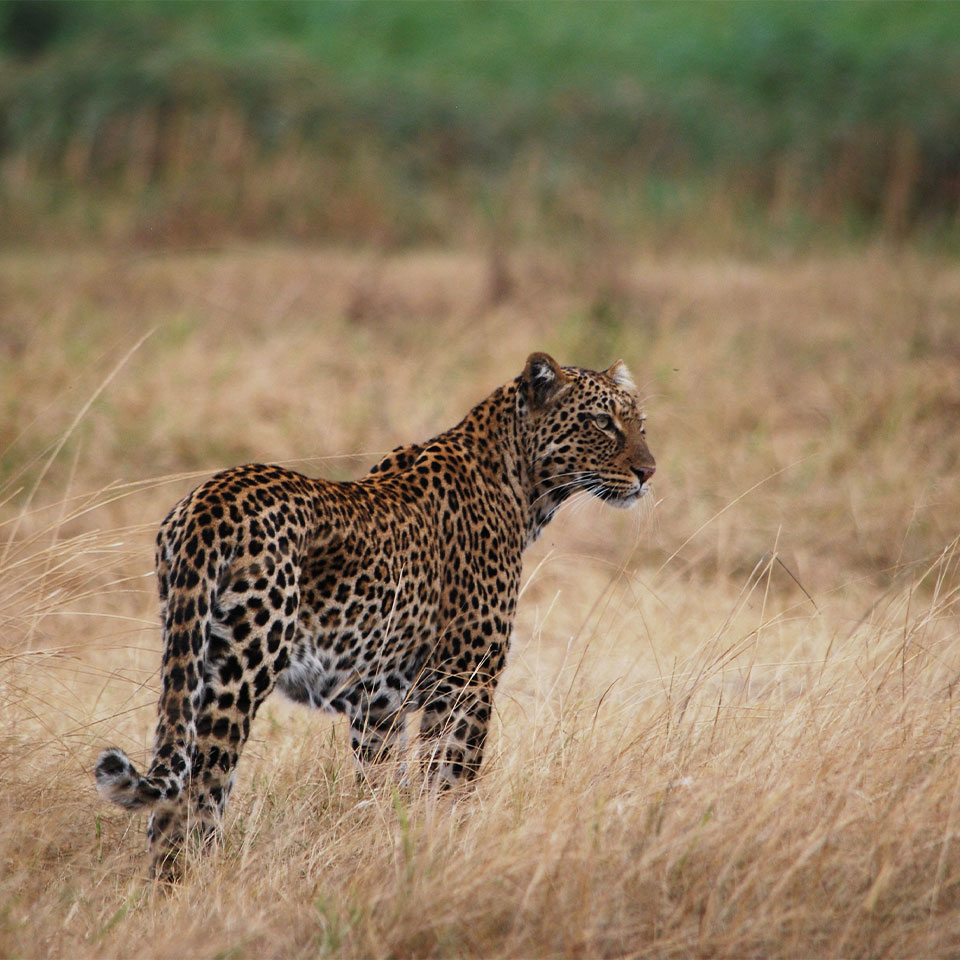
Akagera wildlife
Big 5 - rhino (black & white), elephant, lion, leopard and buffalo.
Maasai giraffe, hyena, defassa waterbuck, zebra, topi, impala, roan, klipspringer, bushbuck, common duiker, eland, oribi, bohor reedbuck, hippopotamus, crocodile, warthog, African bushpig and kudu.
Smaller species include side-striped jackal, honey badger, serval, aardvark, pangolin, olive baboon, vervet and blue monkeys and several species of mongoose.
Birds - 478 species recorded, including shoebill, red-faced barbet, ring-necked francolin, papyrus gonolek, grasshopper buzzard, Tabora and Carruthers' cisticolas, white-crested turaco and northern brown-throated weaver.
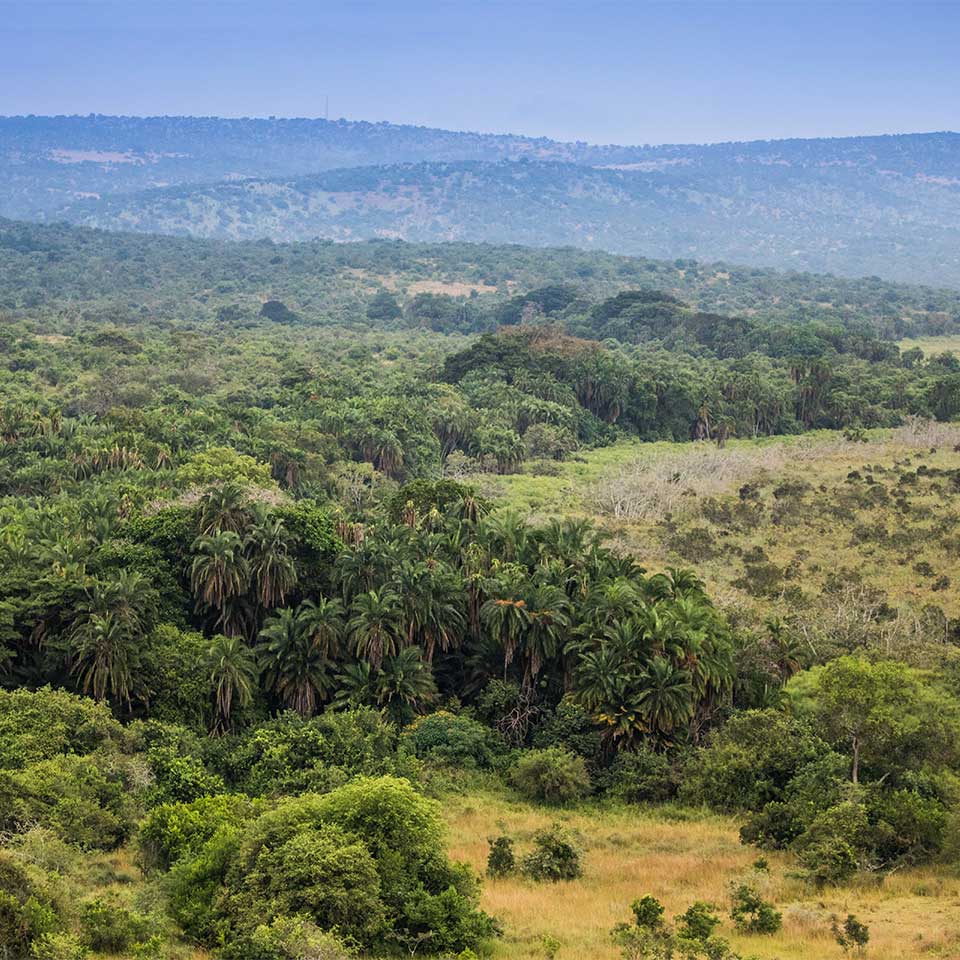
Akagera seasons & landscapes
Open all year round;
The climate is moderate to warm, with average temperatures constant throughout the year;
Rainy seasons - October to December (short rains) and March to May (long rains). The bushveld is green and thick, making game viewing more difficult. Many species have babies (easy targets for predators), and migrating birds arrive;
Dry season - June to September. The bushveld is brown and dry, making it easier to see wildlife.
Large lakes with floating papyrus islands and interconnecting swampland dominate the Akagera landscape. Reeds, towering date palms, figs and other huge trees fringe the lakes. Wooded valleys with candelabra euphorbias away from the water lead to grassed rocky slopes and rolling hills. Further north is more arid, with grasslands, acacias and deciduous woodland dominating.
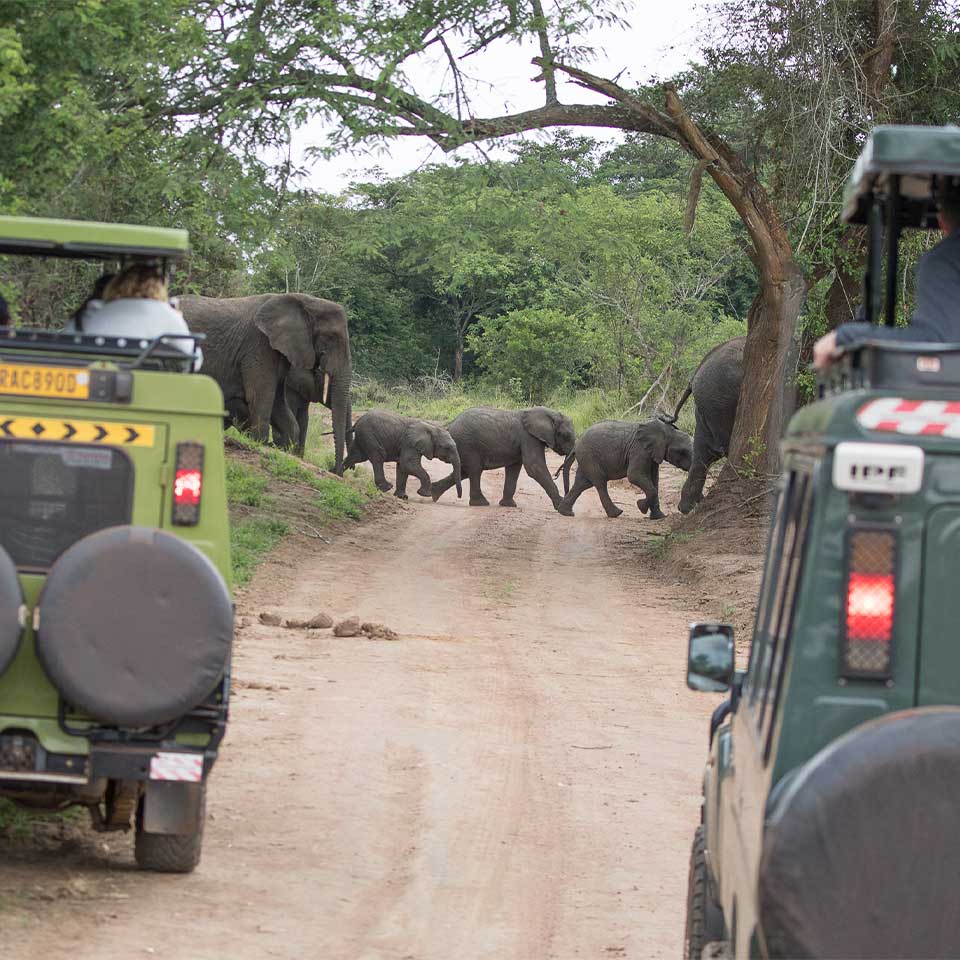
What to do in Akagera
Akagera offers a variety of activities, including:
morning, afternoon and nighttime game drives with spotlight;
freelance guides for self-drive guests;
boat excursions on Lake Ihema (south area only);
bird watching with a local expert guide;
white rhino tracking with park rangers (only in the north of the park)
'Behind-the-Scenes' look at African Parks operations - including a tour of headquarters, attending anti-poaching dog training and access to the control centre (south area only);
community cultural experience - learn about community projects and buy local crafts and honey (south area only);
hot-air ballooning (south area only).
Note that all above activities are optional and incur an additional cost to your accommodation cost
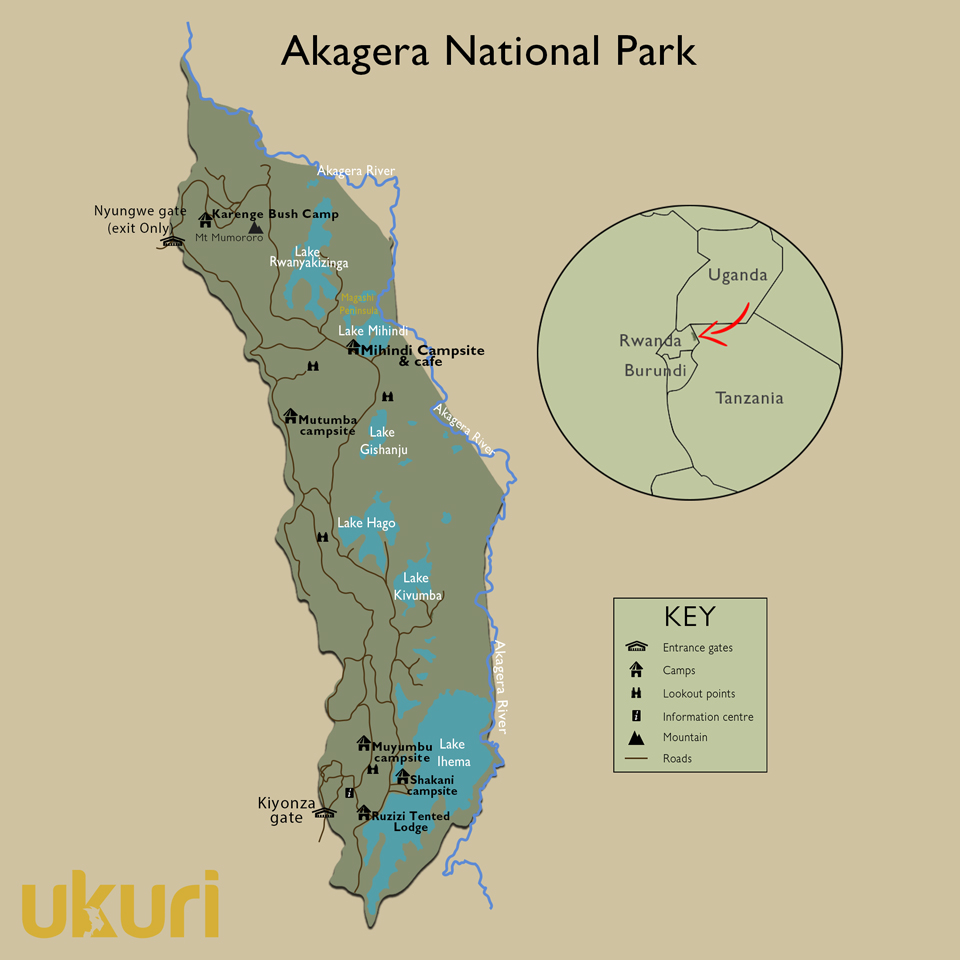
How to get to Akagera
Nearest city + major airport: Kigali 110km / up to 3 hours by road on good tar roads.
Akagera National Park has two gates - Kiyonza gate in the south (entry and exit) and Nyungwe gate in the north (exit only).
There are car rental companies and drivers/guides available in Kigali. Speed limits of 80km/h on open roads and 60km/h in built-up areas are strictly enforced via numerous digital speed trap cameras. 4x4 vehicle recommended in the wet season.
Akagera is also accessible by scheduled or charter helicopter.

Health essentials
Malaria area: Yes
Akagera is a malaria area, although not high-risk. The biggest threat is during the rainy season (October to May), but appropriate precautions are advised throughout the year. Cover your arms, legs and feet from dusk to dawn and use mosquito repellent. Please consult your travel doctor about malaria prophylaxis.
Yellow fever area: No
Rwanda is not a yellow fever area. Vaccination is required for travellers arriving from countries with a risk for yellow fever virus transmission. Please consult your travel doctor before travelling for relevant updates.
Tsetse flies: Yes
Tsetse flies can be a problem in certain parts of the park. Wear light-coloured clothes and make use of insect repellents to avoid being stung.
Water
We advise against drinking tap water unless it is boiled or filtered. Bottled water is widely available in Rwanda. Bring your own refillable water bottles as plastic bottles are not freely available.
Medical emergencies
Akagera is a remote area - please ensure you have evacuation insurance in case of medical emergencies. African Parks utilises the following emergency evacuation service: SATIB24 / ART24 (African risk transfer).
✔️ Vested communities ✔️ Responsible & sustainable
100% of tourism revenue earned by African Parks goes to conservation and local communities
Your safari to Akagera will make a difference for local people
Visiting the African Parks camps in Akagera is the most direct way to support local communities because these camps help boost:
protection against human-wildlife conflict for people living near Akagera via an electric perimeter fence;
the local economy by creating jobs and economic opportunities via tourism and supporting small enterprises such as fisheries, beekeeping, chicken and mushroom farming as well as cooperatives providing casual labour;
local employment via the successful Community Freelance Guides Cooperative;
local skills upliftment - individuals who joined the workforce as casual labourers nine years ago are now adept in plumbing, welding and carpentry, and able to communicate effectively in English. These skills have been passed onto their families and other community members;
environmental education - regular environmental education awareness sessions. Over 18,000 trees planted in schools adjacent to the park.
READ ABOUT the many African Parks community-based projects at Liwonde
Your safari to Akagera will help conservation
Akagera National Park is Central Africa’s largest protected wetland and the last remaining refuge for savannah species in Rwanda. This is thanks to the thriving partnership between African Parks and Rwanda Development Board, which commenced in 2010.
At that time, the park was a depleted landscape overrun by more than 30,000 cattle and little sign of wildlife. Effective law enforcement, strong community engagement and wildlife reintroductions were the foundation for rehabilitation. Today, Akagera continues to provide for the 300,000 people living around its boundaries, directly benefitting from its existence.
Akagera is now a flourishing Big 5 safari destination for Rwandans and international tourists.
READ ABOUT
Information about Rwanda
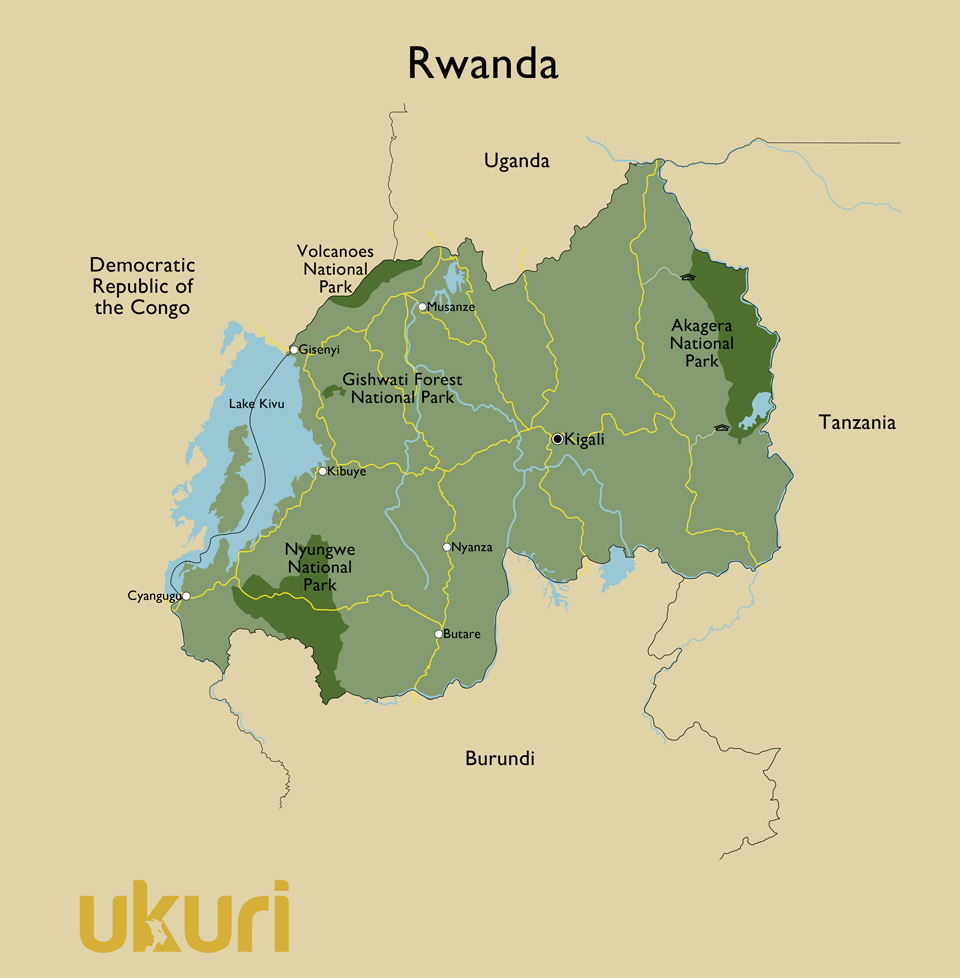
Key Rwanda facts + map
Capital city + tourist hub Kigali.
Languages Kinyarwanda, Swahili, English + French.
Time zone GMT + 2 hours.
Currency Rwandan Franc. Exchange bureaus and ATM's are available in Kigali and most large towns. Many services are via cashless payment only - credit card or local mobile payment gateways/apps.
Visas Enter your details here for visa and other requirements.
Plugs Plug types are C (two small round pins) & J (three small round pins). 230V and 50Hz.
Plastic Note that plastic bags are prohibited, and even plastic bottles are not easy to find. Bring cloth bags and your own refillable water bottle.
Mobile phones SIM cards can be purchased cheaply in Kigali and all large towns. Rwanda has very good phone coverage and internet coverage.
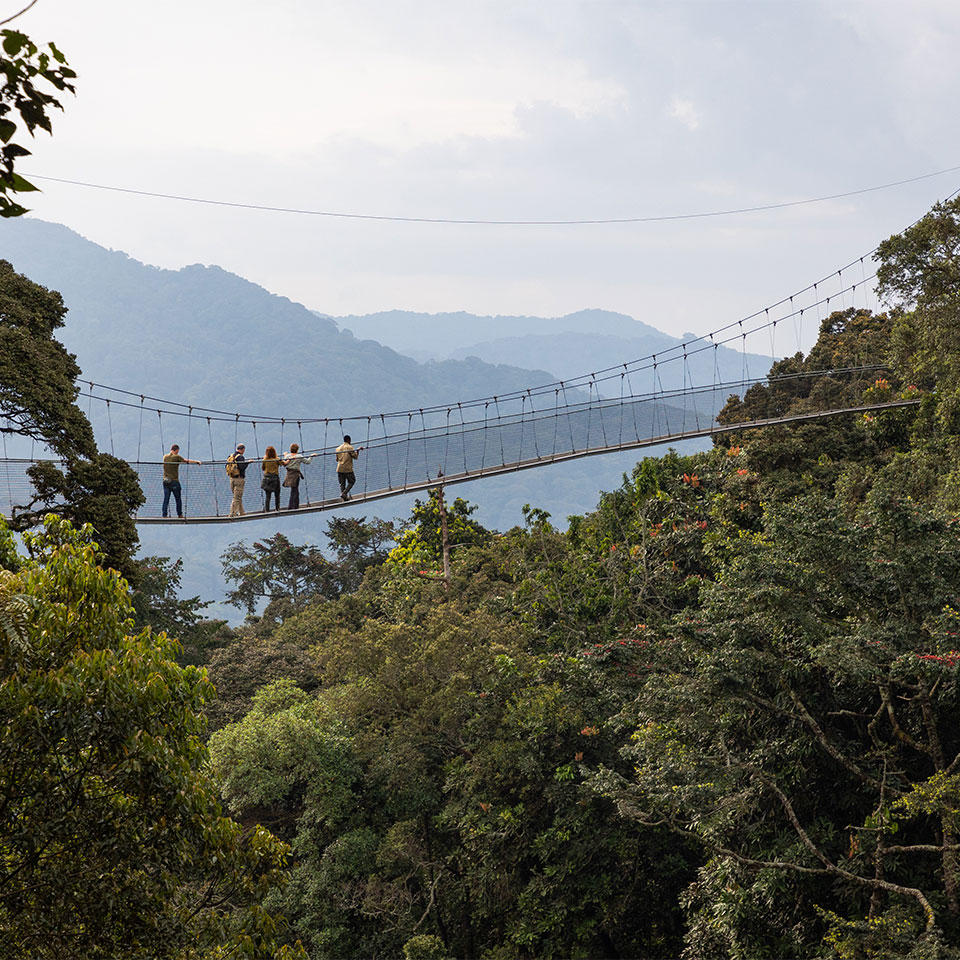
Rwanda travel highlights
Kigali
Rwanda's thriving capital city has modern infrastructure and plenty of restaurants and coffee shops. The Kigali Genocide Memorial is a must-visit if you have a few hours to spare. Kigali is blessed with a wide selection of hotels, B&Bs and guesthouses.
Akagera National Park
Akagera NP shelters Central Africa's largest protected wetland system and offers a superb Big 5 safari experience via game drives and boat trips.
Nyungwe National Park
Nyungwe NP is a magical tract of montane forest bursting with extraordinary biodiversity - excellent for chimp trekking, finding other primates such as the megatroop of 400 Rwenzori pied colobus monkeys, bird watching and the awesome Canopy Walkway suspended bridge.
Volcanoes National Park
Volcanoes NP is a volcanic landscape offering stunning scenery & biodiversity. Major activities include trekking for mountain gorillas and golden monkeys and visiting the legendary Dian Fossey’s grave.
